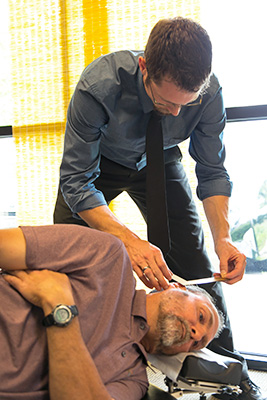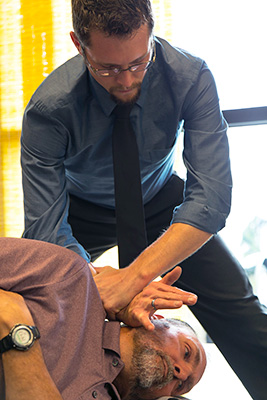 Vertigo is the sensation that you or the things in the environment around you are spinning. A link has been discovered between the onset of vertigo and an injury to the head or neck. If you have been in a car accident, endured a sports injury, or even had a simple trip and fall, the top bones of the neck (the C1 and C2 vertebrae) may have become misaligned. If you notice the symptoms of vertigo shortly afterward, this is most likely the case. Why?
Vertigo is the sensation that you or the things in the environment around you are spinning. A link has been discovered between the onset of vertigo and an injury to the head or neck. If you have been in a car accident, endured a sports injury, or even had a simple trip and fall, the top bones of the neck (the C1 and C2 vertebrae) may have become misaligned. If you notice the symptoms of vertigo shortly afterward, this is most likely the case. Why?
The weight of the head, as much as 14 pounds, sits on these two top neck bones. If they are off kilter by just a tiny bit, the head tilts. This kicks in what is called righting reflex in order to keep the eyes level with the horizon line. To do this, the body compensates by shifting tissues, muscles, and vertebrae, leading to a change in the fluid levels within the ear canals. Another thing that happens is that stress is placed on the brainstem from the misaligned bones. The function of the central nervous system is affected, causing improper signals about the body’s position to be sent to the brain. If these signals do not match the signals being sent from the eyes, ears, and nerves, the brain becomes confused, and vertigo ensues.
Even if you have endured some sort of trauma and are not experiencing vertigo or another health problem that you have not had previously, we encourage you to come visit us here at Balanced Living in Vancouver, Washington. We have had special training to help detect and then realign the tiny misalignments that have occurred in the upper neck. We do this by gently encouraging the bones to move back into place without forcing them by cracking or popping the spine. This results in a longer-lasting, more natural adjustment, allowing the body to heal and communication to be restored. Many patients have seen their vertigo improve or even go away.
To schedule a consultation with Dr. Joe Perin, call our Vancouver office at 360-569-1740. You can also click the button below.
If you are outside of the local area, you can find an Upper Cervical Doctor near you at www.uppercervicalawareness.com.



